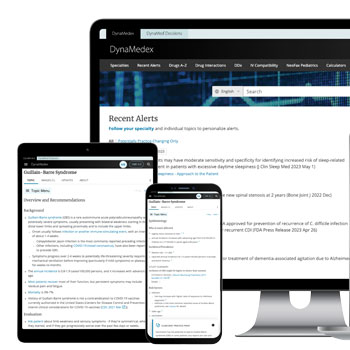Latest updates on ACP's priorities, initiatives
ACP Spotlight offers readers a look at ACP's current top priorities and initiatives, as well as highlights from our e-newsletter, ACP Internist Weekly.
ACP introduces upgraded decision-making platform

DynaMed® is collaborating with ACP to provide free member access to its upgraded, enhanced decision-making platform that combines the clinical expertise and extensive curated disease content of DynaMed® with the comprehensive drug information and advanced search capabilities of Micromedex®. DynaMedex™ delivers fast access to information so ACP members can make the best decisions possible at the point of care.
DynaMedex offers:
- a mobile app that is available through an iOS App Store or Google Play Store,
- advanced clinical decision support, patient engagement tools, access to shared decision-making tools with DynaMed Decisions, and personalized alerts, including those that are potentially practice changing,
- drug interaction checker and IV compatibility tool, as well as comprehensive, trusted adult, pediatric, and neonatal drug information from Micromedex,
- upgraded topic page with a simplified layout and navigation to help users find answers faster,
- natural language chat bot for quick medication answers,
- continuous tracking of CME credits and MOC points (Baylor College of Medicine Office of Continuing Education is the CME provider), and
- neonatal and pediatric monographs from NeoFax/Pediatrics.
More information is available online.
ACP makes recommendations on health care transitions
ACP's recent policy position paper, “Beyond the Discharge: Principles of Effective Care Transitions Between Settings,” details best practices for successful care transitions, emphasizing the importance of establishing a coordinated, communicative, patient-centered, and physician-led care team.
The paper calls for physicians to engage in conversations with patients and families on care goals; for policymakers to address the social drivers of health affecting transitions; for researchers to inform comprehensive transitional care metrics and payment model development; for increased attention to be given to the social, economic, and cultural forces that impact the individual and intergenerational health of marginalized populations during care transitions; and for increased efforts to ensure that clinical care teams are informed of the patient's total care trajectory.
ACP calls for appropriate, meaningful performance measures for telemedicine
A new ACP position paper, “Performance Measures for Physicians Providing Clinical Care Using Telemedicine,” presents six recommendations to ensure the appropriate use of performance measures to evaluate quality of clinical ambulatory care provided in the telemedicine environment.
ACP recommends that any performance measure for telemedicine visits should adhere to the same criteria as in-person visits. ACP also recommends that performance measures be evaluated to determine whether care delivered in a telemedicine setting should be included in the specifications, with careful consideration of how this might impact measure actionability or lead to unintended consequences.
Other recommendations include that physicians, and their information systems, have access to information generated at a telemedicine visit before a performance measure is used to evaluate quality of care; that performance measure testing be conducted for a measure deemed appropriate to evaluate quality of care provided by a physician at a telemedicine visit; that telemedicine visits be incorporated into measure attribution logic; and that performance measures used to evaluate quality of care provided by a physician at a telemedicine visit should not marginalize underresourced communities already affected by the “digital divide.”
The paper was published April 18 by Annals of Internal Medicine. .
ICYMI: Highlights from ACP Internist Weekly
- Multiple agents effective for excessive daytime sleepiness but may be discontinued due to side effects. A systematic review and meta-analysis of 14 trials found that solriamfetol, armodafinil-modafinil, and pitolisant were associated with reduced daytime sleepiness but also with headache, insomnia, and anxiety in patients with obstructive sleep apnea. The study was published May 9 by Annals of Internal Medicine and summarized in the May 9 ACP Internist Weekly.
- Intervention successful in decreasing routine vitamin D testing. In a pre-post study, an EHR-based decision support tool that prompted clinicians about appropriate testing criteria and included a best practice advisory was associated with reductions of 44% and 46% in inpatient and outpatient orders and of 61% and 48% in repeat testing within three months, respectively. The study was published May 2 in the Journal of General Internal Medicine and summarized in the May 9 ACP Internist Weekly.
ACP Internist Weekly is an e-newsletter published every Tuesday. Subscribe online.




